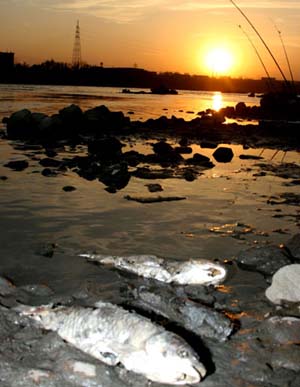
Dead fish can be seen in the Songhua River as the State Environment
Protection Administration confirmed today that pollutants containing
benzene and nitrobenzene contaminated the river after a chemical-plant blast at
the upper reaches in Northeast China. An 80-kilometre swathe of polluted water
was expected to reach the water-sourcing area of Harbin which was forced to cut
off water supply for four days. (newsphoto)
China's State Environmental Protection Administration (SEPA) said in Beijing
today that the Songhua River in northeast China suffered a major water pollution
incident owing to the explosion of a petrochemical plant at the upper
reaches.
"After the explosion at the Jilin Petrochemical Company under China
National Petroleum Corporation, our observation showed pollutants containing
benzene had flown into the Songhua River and caused water pollution," said an
official with SEPA.
Benzene is a substance harmful to human health.
The
official said upon receiving the report, the administration immediately sent
experts to Heilongjiang Province to assist local pollution-control efforts.
Quality of the river water is under close observation for 24 hours every
day.
The Jilin and Heilongjiang provincial governments have activated their
contingency programs for environmental incidents, and have taken measures to
ensure the safety of potable water, said the official.
He said Jilin had
quickly blocked entry of the pollutants into the river and discharged water from
a reservoir to dilute pollutants in the river. It also organized environmental,
water conservancy and chemical experts to discuss pollution control plans, and
beefed up monitoring work.
The finance department of the Heilongjiang
provincial government has allocated 10 million yuan (approximately US$1.23
million) specially for handling the pollution incident, said the
official.
According to the official, observation data shows the degree of
river water pollution has been declining.



